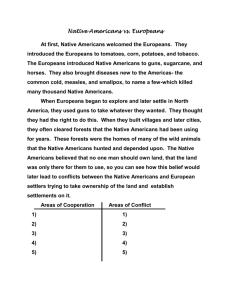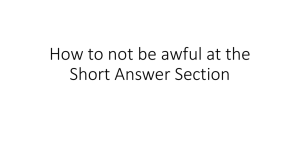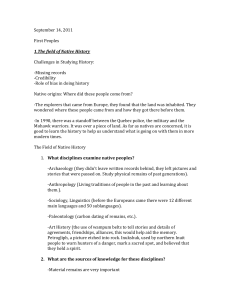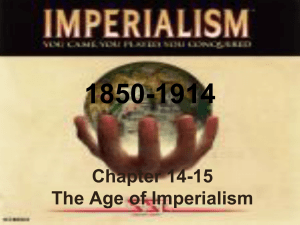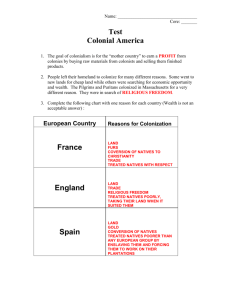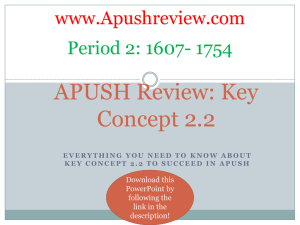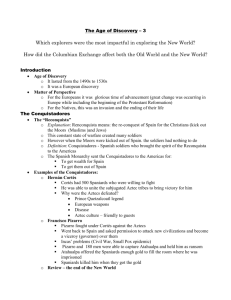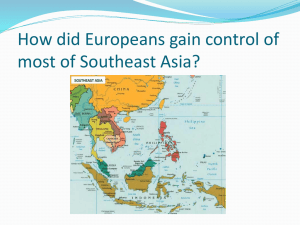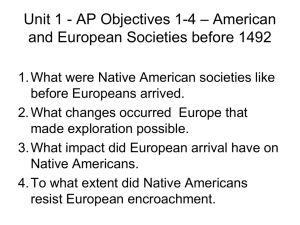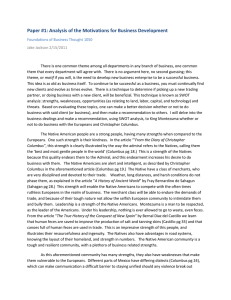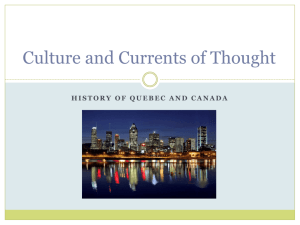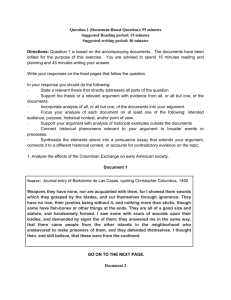MALTEPE UNIVERSITY DEPARTMENT OF FOREIGN LANGUAGES
advertisement
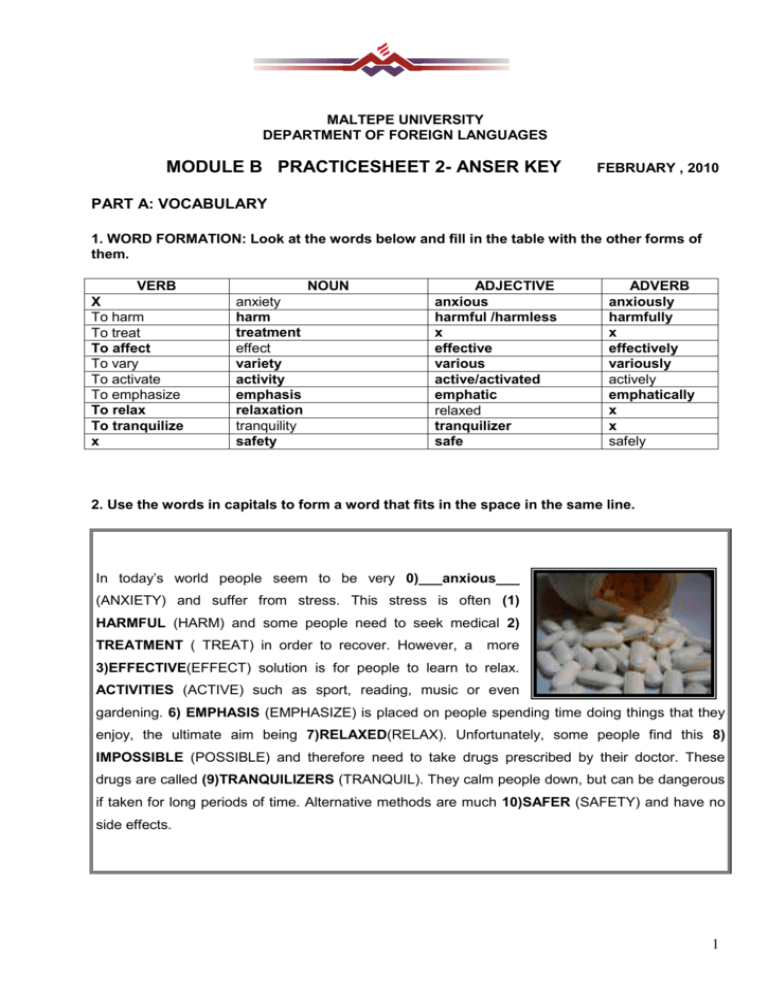
MALTEPE UNIVERSITY DEPARTMENT OF FOREIGN LANGUAGES MODULE B PRACTICESHEET 2- ANSER KEY FEBRUARY , 2010 PART A: VOCABULARY 1. WORD FORMATION: Look at the words below and fill in the table with the other forms of them. VERB X To harm To treat To affect To vary To activate To emphasize To relax To tranquilize x NOUN anxiety harm treatment effect variety activity emphasis relaxation tranquility safety ADJECTIVE anxious harmful /harmless x effective various active/activated emphatic relaxed tranquilizer safe ADVERB anxiously harmfully x effectively variously actively emphatically x x safely 2. Use the words in capitals to form a word that fits in the space in the same line. In today’s world people seem to be very 0)___anxious___ (ANXIETY) and suffer from stress. This stress is often (1) HARMFUL (HARM) and some people need to seek medical 2) TREATMENT ( TREAT) in order to recover. However, a more 3)EFFECTIVE(EFFECT) solution is for people to learn to relax. ACTIVITIES (ACTIVE) such as sport, reading, music or even gardening. 6) EMPHASIS (EMPHASIZE) is placed on people spending time doing things that they enjoy, the ultimate aim being 7)RELAXED(RELAX). Unfortunately, some people find this 8) IMPOSSIBLE (POSSIBLE) and therefore need to take drugs prescribed by their doctor. These drugs are called (9)TRANQUILIZERS (TRANQUIL). They calm people down, but can be dangerous if taken for long periods of time. Alternative methods are much 10)SAFER (SAFETY) and have no side effects. 1 3. Read the text below and choose the correct word for each space. For each space, choose the correct letter A, B,C or D. NATIVE AMERICANS When the Europeans discovered America, they believed they had 0) C India. That is 1)_A__ native Americans were once called Indians. At 2)_B__ , the natives were pleased with the arrival of the Europeans. New tools and weapons were brought to them by the Europeans and they helped 3)__A__ the natives’ lives easier. Along with these new tools, however, the Europeans brought illnesses. The natives were not resistant to these diseases and 4) __D___ died. Alcohol was also 5) __A__ to the natives. The effects of the alcohol would hit them hard and it was at 6) __C__ time that Europeans took advantage and made unfair deals with the natives for their land. Rather 7)__B___ , the natives were left without land. They were forced to live on ‘reservations’, pieces of land that were reserved for them by the Europeans. Many battles were fought by various tribes but the Europeans were 8) __D___ stronger. Today, there are over 500 native American tribes throughout the United States of America. They are US citizens, 9) __C___ they have their own police and they don’t pay taxes. Most of them keep their traditions alive and teach future generations their history, how to hunt and fish and make traditional art and crafts and protect their 10)___B__ culture. 0 A) come B) invented C) found D) made 1 A) why B) when C) where D) how 2 A) beginning B) first C) once D) last 3 A) make B) do C) have D) fix 4 A) every B) little C) much D) many 5 A) new B) fresh C) original D) early 6 A) their B) such C) this D) then 7 A) close B) quickly C) after D) nearly 8 A) more B) lot C) many D) much 9 A) still B) and C) but D) so 10 A) wealthy B) rich C) long D) past 2 PART B: GRAMMAR 1. Fill in with Present Simple or Continuous. 1. A: I AM THINKING (think) about visiting Jane this afternoon. B: I wouldn’t bother. I THINK (think) she is away on holiday. 2. A: Mr Jones HAS (have) a telephone message from his wife. B: Can it wait? He IS HAVING (have) a business meeting and I don’t want to disturb him. 3. A: The police ARE STILL LOOKING (still/ look) for fingerprints left in the room. B: It LOOKS (look) as if they won’t find the criminal. 4. A: I AM SEEING ( see) my boss about a pay rise this afternoon. B: I SEE. That is why you’re wearing a suit and tie. 5. A: Why ARE YOU TASTING (you / taste) the soup? Is there anything wrong with it? B: Yes – it TASTES (taste) too sweet. I think I have used sugar instead of salt. 6. A: John IS (be ) a very rude person, you know. B: I know. Sheila IS BEING (be) very rude these days too, although she is usually polite. 7. A: It LOOKS (look) as if it is going to rain this afternoon. B: I know. I AM LOOKING (look) for my umbrella to take out with me. 8. A: Why ARE YOU SMELLING (you / smell) the inside of your car? B: Because it SMELLS (smell) of petrol and I want to check for leaks. 2. Think about meaning and decide which beginning, a), b), or both , matches each ending and tick (√ ) your choice. Ex. a) They liked playing cards in the evening.. √. b) They liked to play cards in the evening ..√. 1.a) They stopped to have a drink b) They stopped drinking X √ 2. a) He remembered buying some sugar √ b) He remembered to buy some sugar x but that night they decided to go out instead because they were thirsty. but he couldn’t remember where he put it 3. a) Oliver tried taking some aspirin√ b) Oliver tried to take some aspirin X but it didn’t make him better. 4. a) The prisoner went on to say that x b) The prisoner went on saying that √ she was innocent, again and again. 5. a) Simon heard someone screaming X b) Simon heard someone scream √ once and then everything went quiet. 6. a) I heard the tap drip √ b) I heard the tap dripping X and listening to it, I fell asleep. 3 3. Put the verbs in brackets into the –ing form or the infinitive. The Jackal is known 1) to be (be) one of the most dangerous criminals in the world. 2)ROBBING (rob) banks in his specialty, although he also enjoys 3) KIDNAPPING (kidnap) every now and again. So far, the police have failed 4)TO CATCH (catch) him, and they would be very happy 5)TO RECEIVE (receive) any information that could lead to his arrest. The public have been warned 6)NOT TO APPROACH ( not / approach) the Jackal if they see him, as he has a gun and he doesn’t mind 7)USING (use) it. The last person 8) TRYING (try) to arrest him was shot in the foot. Fortunately, we are unlikely 9)TO COME ACROSS (come across) the Jackal in this country in the near future. He was last seen 10)SUNBATHING (sunbathe) on a beach in Brazil. 4. Complete the sentences by using an infinitive or an –ing form. 1. He heard the phone RING but it stopped before he could answer it. 2. When I entered his room I saw him DOING his homework. 3. Then I saw him LEAVE the house, GET into his car and DRIVE away. 4. As they were walking past the house, they saw it BURNING into flames. 5. I saw Gary Lineker SCORE the winning goal in the FA Cup Final. 5. Rewrite the following sentences using the words given. 1. The jumper is so small that I can’t wear it. (TOO) The jumper is TOO SMALL to wear. 2. Staring at people is rude. (TO) It is RUDE TO STARE AT people. 3. Pictures are not allowed to be taken inside the museum. (TAKE) Visitors AREN’T ALLOWED TO TAKE / CAN’T TAKE pictures inside the museum. 4. Speaking with your mouth full is bad manners. (TO) It is BAD MANNERS TO SPEAK with your mouth full. 5. The ground is so slippery that I can’t walk on it. (TOO) The ground IS TOO SLIPPERY TO walk on. 6. Driving fast is dangerous. (TO) It IS DANGEROUS TO drive fast. 7. It was difficult for him to do the crossword. (IN) He had DIFFICULTY (IN) DOING the crossword. 8. Dad didn’t allow me to drive his car. (LET) Dad DIDN’T LET ME DRIVE his car. 9. Could you help me put these curtains up? (HELPING) Would YOU MIND HELPING ME PUT these curtains up? 10.It’s pointless to keep these empty bottles. (WORTH) It IS NOT WORTH KEEPING these empty bottles. 4

